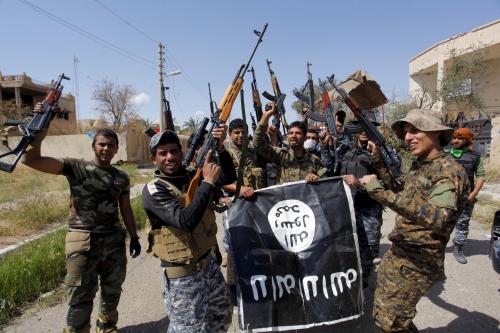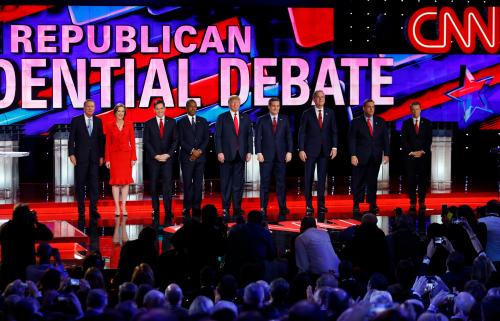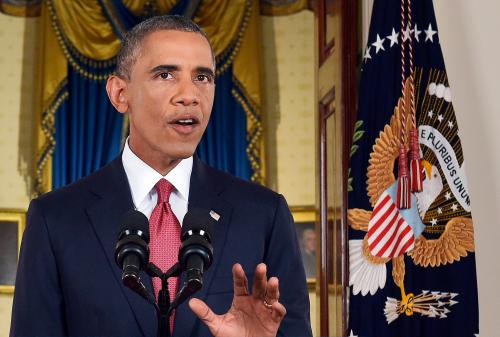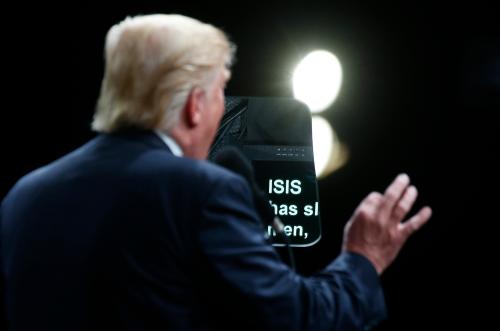The next U.S. president will have to deal with the Islamic State (or ISIS) on his or her very first day in office. The group is an army, a terrorist group, and a proto-state in a strategic region. Its brutal tactics and harsh rule threaten the Middle East and bear at least partial responsibility for the European refugee crisis. With the second Republican presidential debate coming next week, it makes sense to ask what the candidates intend to do about this problem from hell and whether their views make any sense.
1. Oil Spot Strategy: Donald Trump advocates sending American troops in to seize ISIS oil fields because those are the group’s “primary sources of…wealth.” He would “put a ring around it and…take the oil for our country.”
2. You Gotta Believe: ISIS is winning because they are willing to die for their philosophy, even if it’s wrong, argues Ben Carson. Meanwhile, “we are busily giving away every belief and every value for the sake of political correctness. We have to change that.” Presumably, if we go back to old-fashioned American values, we’ll know how to defeat ISIS.
3. Surge: Obama made a “fatal error” when he withdrew American troops prematurely from Iraq, says Jeb Bush. He would send more advisers and trainers to help the Iraqi forces and fight alongside them in the battlefield. In Syria, he would unite the moderate forces and back them with an undisclosed number of American troops to defeat ISIS and Bashar Assad. He would also enforce a no-fly zone over part of Syria to create safe zones for civilians.
4. Feel the Pain: Ted Cruz only wants to tangle with ISIS for threatening “to attack the United States” and “for killing American civilians.” Even then, it would only be an “overwhelming air campaign to destroy the capability of ISIS to carry out terrorist attacks on the United States.” Otherwise, Cruz is not keen on fighting in other people’s civil wars or on nation building after the war is over.
5. Proxy War: “You cannot defeat ISIL unless you hit them in those parts of Syria that they now control where the Syrian government is not even present,” says Marco Rubio. America should do the hitting from the air but leave it to the regional governments to “confront [ISIS] on the ground with U.S. special forces support, logistical support, intelligence support.”
6. Surge Light: Scott Walker’s surge is less aggressive and less specific than Jeb Bush’s. It involves a no-fly zone in Syria and more advisers in Iraq who are permitted to fight ISIS. He’d increase the training of Syrian rebels to fight against the Islamic State and Assad but, unlike Bush, he doesn’t say he’d back them with American troops on the ground.
7. Talk to Our Friends: Carly Fiorina believes its “premature” to come up with a new plan to deal with ISIS. “Okay there are all these alternatives in front of us that our allies who are there have told us will help, and we’re just going to leap over all of those and talk about boots on the ground,” she says. Instead, we should hold a Camp David summit and “talk with our Arab allies about what they need from us to fight this fight.”
8. Talk to Our Friends II: John Kasich’s position is the same as Fiorina’s—let’s talk to our Arab friends first and develop a plan together. He knows putting large numbers of U.S. troops on the ground isn’t politically popular but he believes it’ll come to that eventually.
9. Kurds and Bombs: Mike Huckabee wants to send more weapons to the Kurds and “bomb the daylights” out of any ISIS target. He’s reluctant to commit large numbers of U.S. troops. If there’s boots on the ground, “they have to be more than just U.S. boots. There have to be boots that come from the Saudis, the Jordanians, and others.”
10. Proxy War II: Chris Christie would train the troops of friendly Arab governments “who all see ISIS as an existential threat to their existence.” His plan is to support them with intelligence and with weapons. “We don’t want to be occupiers in the Middle East. We want to fight them there so they don’t come here.”
Will any of these work?
None of the top ten Republican candidates want to commit large numbers of American troops to fight on the ground in Syria and Iraq. Bush and Walker want to do a bit more, Cruz wants to do a bit less, and most of the rest of the field wants to leave it to our Sunni Arab allies to figure out.
Interestingly, the two candidates with the most unique strategies are also the frontrunners in the presidential race. Trump wants to occupy oil fields and Carson wants Americans to believe in themselves. The two candidates frame their strategies as a return to strength in American foreign policy without actually committing to a real show of force. That’s similar to the way Obama frames his own policy.
So would any of these strategies actually work? We can leave aside the non-strategy strategies of letting our allies come up with a plan or believing in ourselves. Those aren’t actual plans, although they might lead to plans. So we’re left with the Surge of Bush and Walker, the Feel the Pain strategy of Cruz, and the Oil Spot strategy of Trump.
Trump’s won’t work because oil isn’t actually the group’s primary source of wealth.
Bush and Walker’s Surge appeals because at least it focuses on the source of the problem in Syria, which is the Assad regime. But what happens if the plan is successful? And what will they do about all the other Islamists who are vying for power once he falls? We’re not told.
As for Cruz’s plan, it’s pretty modest: teach ISIS not to mess with the United States. But it has a clear goal that’s in line with ISIS’s own chief priority, which is to build a state in the Middle East rather than attack the United States.
That’s a fact that gets lost in the din of overheated rhetoric about the threat the Islamic State poses. It’s a serious threat to our allies in the Middle East and, via the refugees, to Europe. But it’s not yet a threat to the U.S. homeland. The worthy debate in the Republican primaries should be over whether the United States should lead its allies against an enemy that threatens them more than it threatens us.






Commentary
Ten silly ideas for fighting ISIS
September 11, 2015